@LITTLEROCKFAMILYDENTALCARE
Follow Us On InstagramDentures Little Rock
For Full and Partial Tooth Replacement
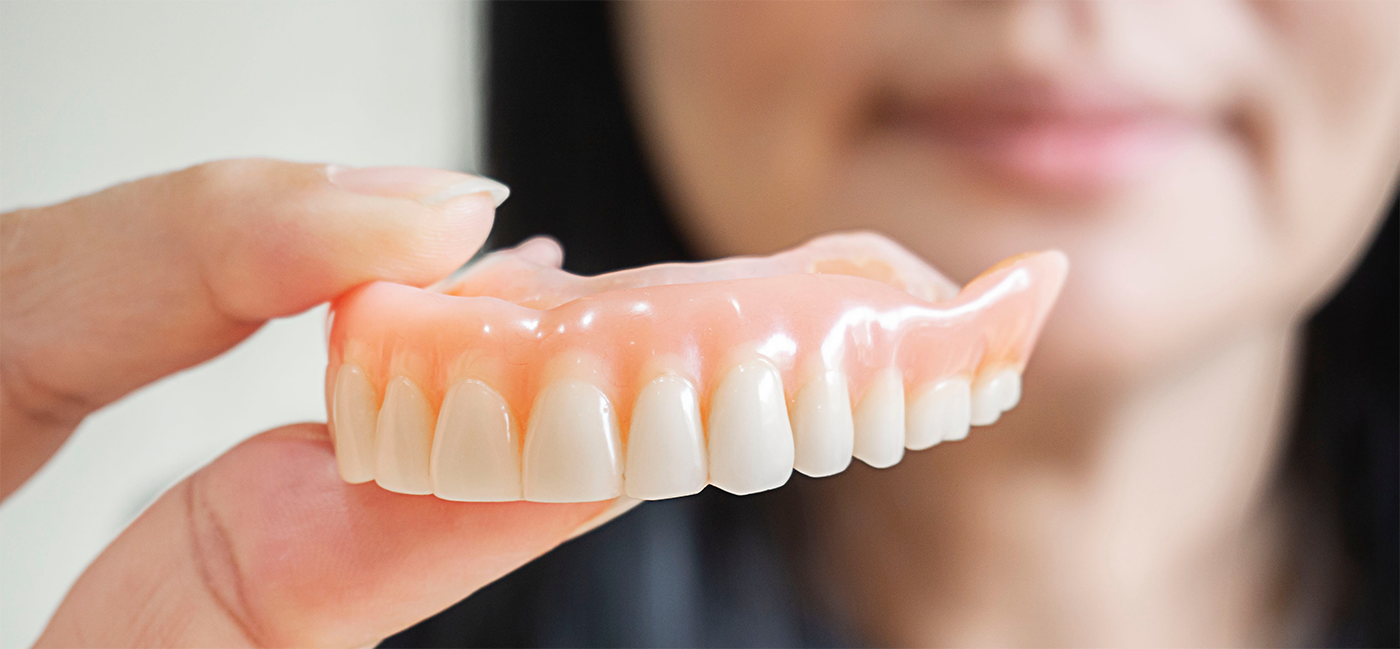
While dentures have been around for literally hundreds of years, that doesn’t mean the dentures you receive today will be anything like what previous presidents or century-old civilizations used. They have come quite a long way since then in both function and esthetics, so you can feel confident about your future smile. Little Rock Family Dental Care is more than prepared to design and create a personalized denture for you and your family members, so don’t hesitate to call us today to schedule your first appointment at our Little Rock dental office!
Why Choose Little Rock Family Dental Care for Dentures?
- Highly Trained Prosthodontist In-House
- Personalized and Natural-Looking Restorations Utilized
- Caring and Dedicated Team Members
Who’s a Good Candidate for Dentures?
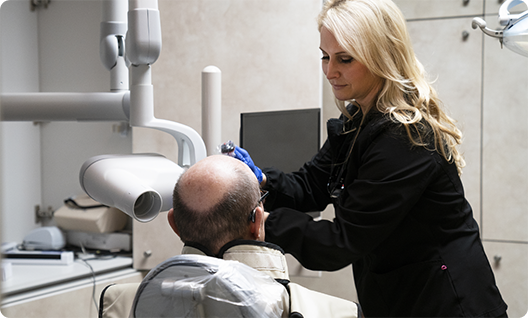
Even if dentures can be an ideal solution for your tooth loss, you’ll still need to undergo an initial consultation with our team before moving forward with the treatment. Your dentist will thoroughly assess your oral situation, including your gum health, jawbone density, and the number of teeth that you’re missing. If we do find that you’re eligible for the process, we’ll be able to offer you a completely personalized and natural-looking prosthetic that you can be proud to use and show off! Read on to learn if you’re a good denture candidate or reach out to us today if you want to schedule your appointment.
Effects of Missing Teeth
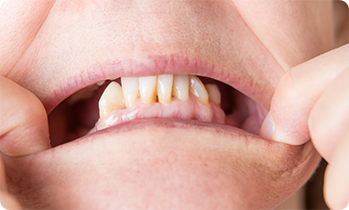
Before starting your tooth-replacement treatment, it can benefit you to understand the causes of tooth loss as well as the consequences of not replacing your missing pearly whites. Some of the most common reasons this issue occurs include tooth decay, periodontal disease, poor oral hygiene, and accidental injury. Other particular systemic problems can also result in missing teeth.
Once you’ve lost some teeth, it’ll be especially crucial that you replace them as soon as possible. Not doing so can lead to further complications down the road. In many cases, your remaining teeth can start to shift out of place to fill the gap, your gums might begin receding, and your jawbone can start to weaken and deteriorate. Other effects may involve trouble speaking, difficulty chewing, facial sagging, and reduced self-esteem.
What Qualifies You for Dentures?
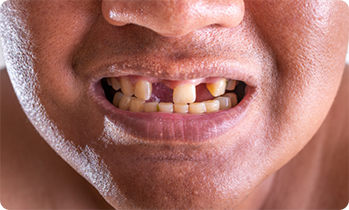
Virtually any person who is missing pearly whites to any degree can receive dentures in Little Rock. Whether you’ve suffered severe tooth loss, sensitive teeth, or dental decay, this treatment can be an incredible solution for you. That said, having sufficient jawbone mass and healthy gum tissue is a prerequisite for this tooth replacement method.
Since dentures can come in various shapes and sizes, we’ll need to verify the number of teeth that you’re missing to determine the type that you’ll get. The most common options our team offers are partial dentures, full dentures, and implant dentures. These prosthetics are generally more cost-effective than other treatments, meaning you likely won’t have to break the bank to work within your budget.
Alternative Tooth-Replacement Options
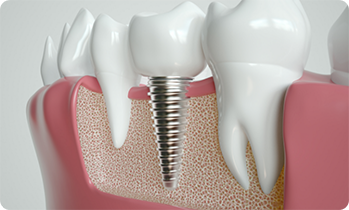
If you aren’t currently a good candidate for dentures, it doesn’t mean you’ll automatically be out of restoration options. You can also explore our alternative tooth replacement solutions, including:
- Dental bridges – Missing one or several teeth in a row? If so, dental bridges may be the best option to choose. This restoration utilizes the healthy adjacent teeth on either side of the gap to support it, allowing you to have a full bite again.
- Dental implants – Instead of relying on nearby teeth or the gumline, we can embed titanium posts into the jawbone to provide an incredibly stable foundation for your new smile. By serving as your new permanent roots, you’ll regain 80% or more of your natural chewing power without worrying about your new teeth slipping out. Though this procedure has a higher cost, the results can last several decades to a lifetime with proper care!
Learn More About Dental Bridges
Learn More About Dental Implants
Partial Dentures vs. Full Dentures
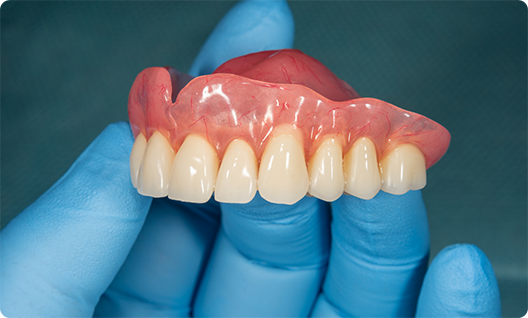
When you’re considering traditional dentures (outside of implant-retained versions), you have two options to consider. The solution you choose will largely vary depending on what your specific needs might be. These options include full dentures and partial dentures.
Full Dentures
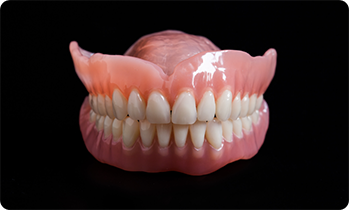
When you have lost all of your teeth in a given arch (or both of your arches), a full acrylic and ceramic denture is the most appropriate solution to restore your smile. This denture is held in place via the natural suction of your gums as well as the shape of your mouth. In the beginning weeks of using your denture, you may need to use denture adhesive to ensure stability and help your mouth adjust to its presence.
Partial Dentures
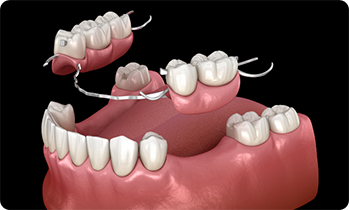
Made from a metal base and ceramic restorations to replace teeth, partial dentures are designed to fit inside of your mouth much like a puzzle piece. Instead of replacing the entire arch at a time, they only fill gaps throughout the mouth, ideally those on opposing sides. They also rely on metal hooks that wrap around teeth to stay in place.
If you are missing several teeth throughout your mouth or have no remaining teeth whatsoever, a denture just might be for you!
How Dentures are Made
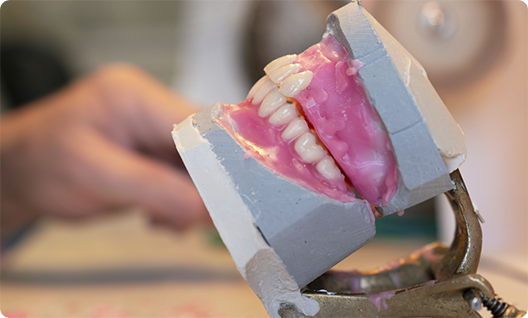
As you can imagine, choosing to get dentures prompts curiosity about the creation process. Learning about their fabrication and the materials shaping your artificial teeth will help you appreciate your newfound smile much more. Whether you need a partial, full, or immediate denture, click on the button below to unveil the magic behind the denture creation process in Little Rock.
What are Dentures Made Of?
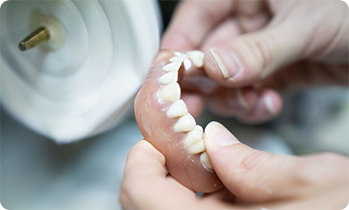
Dentures consist of two main parts: the denture base and the artificial teeth. Let's dive into each component:
- Denture Base – This foundational structure supports artificial teeth and can be crafted from materials like acrylic, nylon, porcelain, resin, or metal. Acrylic is common for full dentures, as it can mimic your natural gum tissue. Partial dentures may feature metal clips on an acrylic base, with nylon occasionally replacing acrylic.
- Artificial Teeth – Usually made from resin or porcelain for their natural appearance. Porcelain is favored due to its lifelike look and feel, along with its durability. However, it's mainly recommended for full dentures due to its slight abrasiveness on neighboring teeth.
The Denture Creation Process
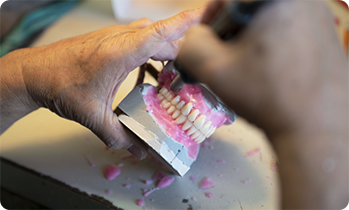
Crafting custom dentures involves a meticulous, multi-step process tailored to each patient's mouth. Here's a detailed breakdown of the typical procedure:
- Step 1 – The dentist, or prosthodontist, takes impressions of the upper and lower gums using a paste to create a plaster model, a replica of the mouth's shape and size. Jaw measurements may also be taken to ensure accuracy.
- Step 2 – The model is sent to a dental laboratory where a wax version of the gumline is formed.
- Step 3 – Artificial teeth, made of acrylic resin, are positioned using an articulator device and wax. The technician shapes the wax for a gum-like appearance. This wax base acts as the template for the final dentures.
- Step 4 – The wax dentures are fitted on the patient by the dentist/prosthodontist. Once approved, temporary or immediate dentures are worn while the permanent ones are being created at the lab.
- Step 5 – Back at the lab, the technician heats the dentures to eliminate wax. The dentures are placed in a flask that's filled with plaster and then subjected to heat to melt the dentures into shape.
- Step 6 – Holes are created in the teeth to facilitate the attachment of materials. A liquid separator is added to prevent acrylic from sticking to plaster. Acrylic replaces wax in the flask.
- Step 7 – Careful removal of plaster reveals the acrylic denture. An ultrasonic bath removes any residual plaster.
- Step 8 – Excess acrylic is trimmed, and the denture is meticulously polished.
- Step 9 – The patient returns for fitting. Adjustments are made as needed to ensure optimal functionality and comfort. This comprehensive process guarantees a well-fitting and natural-looking denture for each individual.
Adjusting to Your New Dentures

Experiencing initial discomfort with dentures is common. Patients might encounter mild soreness and speech and eating challenges at first. However, the mouth gradually adapts, making dentures feel more natural over time. To speed up the adjustment process, you should opt for soft foods, exercise facial muscles, and try denture adhesive. Should discomfort linger, consulting our team is recommended for potential adjustments.
The Benefits of Dentures
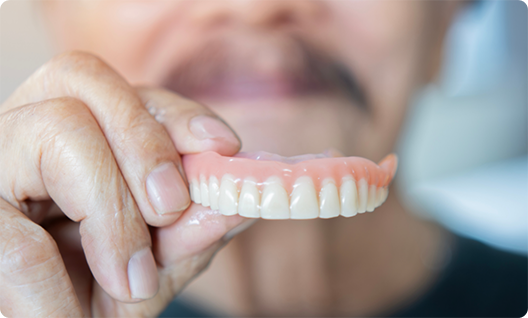
It really is a challenge to live without a full smile. Even if you only lack a few teeth, the situation interferes with eating, speaking, and smiling. Thankfully, though, you can trust dentures to address your tooth loss. In doing so, these prosthetics offer many perks that improve your quality of life! If you’d like to know more, we at Little Rock Family Dental Care will happily explain. Just keep reading to learn the benefits of dentures, or call our office for details.
Psychological Benefits

As you may well know, tooth loss is a hard thing to accept. Losing the full smile you’ve had for many years can be unnerving. Consequently, the scenario reduces your self-esteem and body image. From there, you may feel tempted to retreat from social settings and become sad or depressed.
Fortunately, dentures act as a potential solution. They could restore your entire smile and thus re-awaken your self-confidence. As a result, you’d have lower anxiety and feel more at ease about your looks, speech, eating ability, and more.
Clearer Enunciation

You'll struggle to talk when you don’t have all your teeth. After all, you need pearly whites to position your lips and tongue properly. It’s hard to move your mouth and form words without them. Even with your best efforts, you might have a speech impediment like a lisp.
Still, you can count on dentures to act as substitute teeth. So long as they’re well-fitted, they can support your tongue and lips for speech. That said, you’ll need to adjust to them first. Speaking with these new teeth naturally takes practice.
Improves Nutrition

If you don’t have all your teeth, meals become tricky. That’s only natural – you need pearly whites to chew food. As such, tooth loss may cause you to restrict your diet. You’ll likely find healthy foods with tough textures too difficult to chew. Still, the resulting shift in your eating habits could lead to malnutrition or indigestion.
In contrast, dentures would prevent these outcomes. They act as artificial teeth that chew food almost as well as natural ones. Therefore, the restorations widen your dietary options to ensure proper nutrition.
Preserves Oral Health

Aside from ruining your looks, tooth loss harms your grin’s health. The resulting smile gaps serve as breeding spots for harmful bacteria. These spaces also pull on your surrounding teeth, tilting them over time. Should that process go unchecked, it’ll eventually make your remaining chompers fall out.
All the same, dentures will protect oral health by “filling in” the gaps. They’d then prevent nasty germs from growing. Furthermore, they’d keep your other teeth from tilting.
Expands Opportunities

You obviously need a nice smile for good first impressions. For better or worse, people notice your grin before your other features. That being the case, gorgeous teeth strengthen your connections – with friends, family, co-workers, etc.
As it happens, dentures give you such teeth. These replacements look like normal pearly whites and blend seamlessly with your smile. You can, then, trust them to expand your opportunities with others. They might even allow you to get a promotion or raise at work. In that scenario, your dentures could practically pay for themselves!
The Treatment Process for Dentures
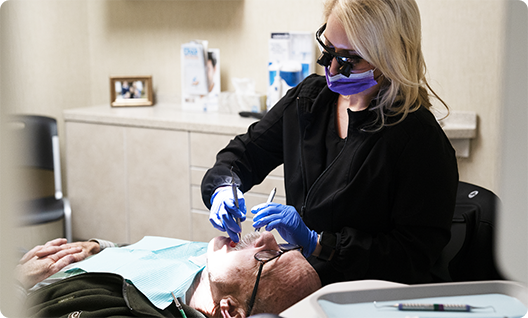
When you arrive for your consultation, one of our dentists will closely examine your mouth and confirm which type of denture would best meet your needs. Afterward, they’ll remove any remaining teeth that are no longer viable and get an impression of your mouth so that a denture can be created. After about two weeks or so, you’ll come back to our office to have the denture fitted and placed. Our dentists will make sure to go over tips to take care of your denture, how to practice at-home oral care, and more.
Understanding the Cost of Dentures
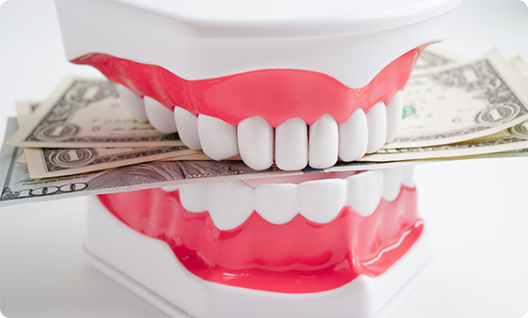
Your financial situation should never stand in the way of replacing your missing teeth. We strive to keep dentures affordable for everyone. While various factors influence the cost of dentures in Little Rock, they generally range from $750 to $1,500. We provide the solutions you need to rebuild your smile without breaking the bank.
Factors That Affect the Cost of Dentures
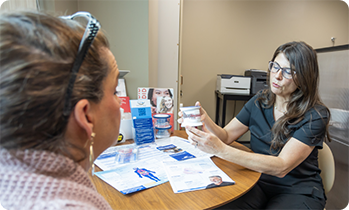
Every mouth is unique, so a one-size-fits-all denture would be uncomfortable. Instead, your denture is custom-made to fit your mouth like a glove. After examining your mouth and learning more about your preferences, we will create a personalized plan to treat your tooth loss. Although every plan differs, you can expect your estimate to include:
- Preparatory Procedures: It’s not uncommon to require a little prep work, like tooth extractions or periodontal therapy.
- Type of Denture: The type of prosthetic will affect the cost, as well as the number of teeth and arches you are replacing.
- Materials: Discount materials can cost more in the long run. Focus on quality to ensure your investment lasts.
Your dentist will review all your options to help you make the smart choice for your smile. Rest assured, you’ll know exactly what you will have to pay before committing to anything.
Are Implant Dentures More Expensive?
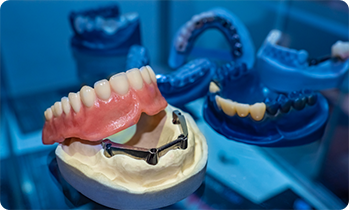
Implant dentures are more affordable than many people realize. Although you may pay more upfront, they are the most cost-effective method. Dental implants can last for decades with the right maintenance, unlike traditional dentures, which need replacing every 5 to 10 years.
Not to mention, dental implants will keep your jawbone strong to improve your oral health. You’ll avoid many issues associated with tooth loss to lower your dental expenses in the long-term. You can’t put a price tag on the benefits you’ll gain from an implant denture. You will enjoy the next best thing to your real teeth with the help of your denture dentist in Little Rock.
Does Dental Insurance Cover Dentures?

Every insurance policy differs, but most dental insurance can be used to offset the amount you pay for dentures in Little Rock. Most plans consider them a major service, so they are covered about 50% after meeting your deductible. A member of our team will work on your behalf with your dental insurance to file the required forms to maximize your annual allowance. We will explain how your coverage is being used and if you have any remaining balance.
Other Options for Making Dentures Affordable

Besides using your dental insurance, we offer various financial solutions for any out-of-pocket expenses, including:
- Traditional Payments: We accept all traditional payment forms, including cash, checks, and credit cards.
- Special Offers: Ask us about any current patient specials.
- Third-Party Financing: Pay for your denture using monthly installments through a third-party financing company, like CareCredit.
If you are concerned about paying for your denture, or you are ready to request your consultation, contact our office today. We look forward to helping you achieve your best smile.
Denture Aftercare
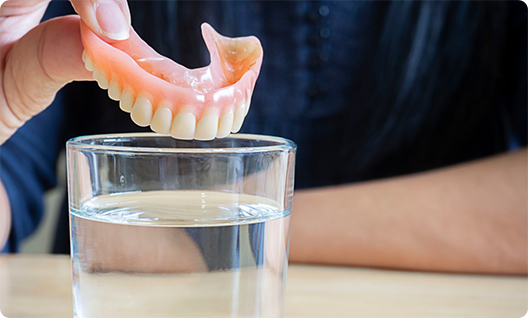
At their best, dentures will transform your smile’s looks and function. You’ll then have a much higher quality of life! However, the prosthetic teeth in question still need upkeep. Dentures won’t work correctly if they don’t get regular maintenance. On the contrary, they’ll fail quickly and cause your mouth problems. Still, Little Rock Family Dental Care can help. Below are some tips on caring for dentures. To help your restored grin last longer, consider giving them a read.
Remove After Eating - Removable Dentures

For starters, rinse your dentures after each meal. This habit will keep food debris and plaque from sticking to them. As a result, you’ll have a lower risk of oral health issues.
All that said, remember to avoid hot water for these rinses. High-temperature liquids can warp denture material. In other words, a hot water rinse would distort your denture’s fit.
Clean Your Restoration

Besides regular rinses, you should also give your dentures a daily cleaning. Doing so removes bacteria and “leftovers” that might stick to the prosthetics.
Generally, the process for such a cleaning isn’t that tricky. You simply need to brush the prosthetic(s) (outside of your mouth) with a soft-bristled toothbrush and some hand soap. Just ensure you don’t use toothpaste in this work, as its abrasiveness damages dentures.
After brushing, soak the dentures in a cleansing solution as time allows. From there, rinse them before putting them back in your mouth.
Keep Your Dentures Safe
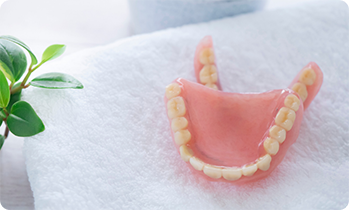
Dentures may be durable, but they’re not invincible. They can (and will) break from excess force. That being the case, do what you can to keep them safe.
A few ways exist to protect dentures. For example, place a towel in the sink for daily cleanings; it would cushion the prosthetics from falls. You could also store the dentures securely when they’re not in use. With this approach, kids or pets wouldn’t reach and break via roughhousing.
Remove Dentures When You Sleep

As lifelike as they are, dentures shouldn’t be worn overnight. It’s better if you remove them before bed and store them properly. Ideally, you could put them in a glass of soaking solution; the material keeps dentures moist while you sleep.
The reality is that a constant denture isn’t healthy. If you wear the prosthetic overnight, you’ll restrict your gums’ circulation and cause tissue irritation. The act would also increase your mouth’s plaque levels, as well as your risk for pneumonia.
Notice Changes

When it comes to dentures, monitor them and your mouth for changes. Things like mouth sores, gum irritation, or infection systems need immediate care. Without it, your oral health will quickly decline and suffer complications.
In particular, see a dentist if your dentures suddenly fit poorly or get damaged. Trying to fix the restorations yourself will worsen things. On the other hand, a dental professional can refit or even replace the dentures. You could then maintain your treatment results without incident.
Dentures FAQs
Will my dental insurance cover the cost of dentures?
Since dental insurance helps make the cost of even the most extensive treatment plans more affordable, it’s not surprising that many patients wonder whether their coverage includes dentures. If you’ve asked yourself something similar, then you’ll be happy to know that many insurance providers cover 50% of restorative treatments! However, since each plan is unique, it is a good idea to read the fine print of yours and reach out to their team with any questions you have.
How should I clean my dentures?
Dentures typically last between five and ten years. Although, many patients enjoy theirs for much longer thanks to proper care and maintenance! To prolong the lifespan of yours, make sure to clean them daily with a soft-bristled toothbrush and denture-friendly toothpaste. Like your natural teeth, make sure to gently scrub each surface to remove food particles, plaque, and bacteria. It is also a good idea to soak them overnight in a special cleaning solution to preserve their shape and disinfect them.
When should I replace my dentures?
If your dentures break, no longer fit, or it is simply time, then they should be replaced. At your routine visits with our team, we will conduct a dental exam, check their structure, and ensure they fit correctly so they continue to look and feel as natural as possible. However, if we notice any warning signs, like excessive movement, then we will suggest having them replaced.
What if my dentures break?
Although dentures are crafted from high-quality, durable materials, they can break. Therefore, it is a good idea to always handle them with care and carry them in a soft cloth when transferring them. However, if yours cracks or shatters on the floor, do your best not to panic. Instead, safely gather the pieces and contact our office. From there, we can schedule an appointment to have them repaired or to custom-make a new one.
Are there any food restrictions with dentures?
As you adjust to your dentures, it is a good idea to take it easy with food. Start with soft foods that don’t require excessive chewing, like yogurt, soup, and scrambled eggs. Once you build your proficiency, you can begin to transition back to your previous diet. However, foods like red meat, crackers, and raw carrots increase the risk of irritation and inflammation, so you should continue to stay away from those foods when possible. If you have any questions about specific items, don’t hesitate to contact our office!




